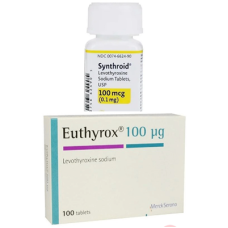Synthroid vs. Euthyrox: Same or Different?
When it comes to managing hypothyroidism, two popular options frequently prescribed by doctors are Synthroid and Euthyrox. Both medications are synthetic forms of levothyroxine sodium, designed to replace or supplement the thyroid hormone thyroxine (T4) in individuals whose thyroid gland is not producing enough of this essential hormone. Although Synthroid vs. Euthyrox: Same or Different?
1. Active Ingredient: Levothyroxine Sodium
Synthroid and Euthyrox are both brand names for synthetic levothyroxine sodium, which is identical to the natural T4 hormone produced by the thyroid gland. This hormone is critical for regulating metabolism, energy levels, and other bodily functions. In individuals with hypothyroidism, where the thyroid gland does not produce enough hormones, or in those who have had their thyroid removed, levothyroxine helps restore normal hormonal balance.
Since both medications are essentially the same at the molecular level, their primary effect on the body is identical.
2. Branding Differences
1. Synthroid
Synthroid is produced by AbbVie Inc., a leading global biopharmaceutical company based in the United States. Synthroid has been on the market since the 1950s and has established itself as one of the most widely prescribed brands of levothyroxine. AbbVie’s rigorous quality control and extensive research history make Synthroid a reliable choice for many patients.
2. Euthyrox
Euthyrox is manufactured by Merck KGaA, a German pharmaceutical company known for its precision in production and innovation. Euthyrox is marketed under various brand names in different countries (such as Eltroxin) but retains the same formulation and manufacturing standards. Merck’s emphasis on producing consistent and well-tolerated thyroid medications has made Euthyrox a preferred choice for many patients globally.
While their branding may vary, the formulations and therapeutic effects of Synthroid and Euthyrox are the same.
3. Dosage and Administration
Both are available in a variety of dosages to cater to individual patient needs, ranging from 25 mcg to 300 mcg.
Synthroid and Euthyrox are taken as oral tablets, usually once a day, ideally on an empty stomach to improve absorption.
4. Efficacy and Effectiveness
Because they contain the same active ingredient, Synthroid and Euthyrox are equally effective.
5. Side Effects and Safety
Both Synthroid and Euthyrox share the same side effect profile, as they contain levothyroxine sodium. Common side effects include:
Heart-Related Symptoms:
Palpitations or Increased Heart Rate (Tachycardia): An elevated heart rate or irregular heartbeat can occur, especially if the dosage is too high.
Chest Pain or Angina: Excessive thyroid hormone levels can increase the workload on the heart, causing discomfort or pain.
Nervous System Symptoms:
Nervousness or Anxiety: Over-replacement of thyroid hormone can lead to increased anxiety, nervousness, or restlessness.
Insomnia: Difficulty sleeping or restlessness is a common issue if the dose is too high.
Gastrointestinal Symptoms:
Increased Appetite: An increase in metabolism can lead to a heightened appetite, which may result in weight fluctuations.
Diarrhea: A hyperactive thyroid state can cause digestive issues like diarrhea or abdominal discomfort.
Weight Changes:
Weight Loss: If too much levothyroxine is taken, it can cause unintentional weight loss due to an increase in metabolic rate.
Weight Gain: An insufficient dosage may not adequately relieve symptoms of hypothyroidism, potentially causing weight gain.
Heat Sensitivity and Sweating:
Increased sensitivity to heat and excessive sweating can be a sign that the medication dosage is too high.
Muscle and Joint Pain:
Some patients may experience muscle weakness or joint pain, especially if their hormone levels are not balanced.
6. Drug Interactions
Medications that Reduce Levothyroxine Absorption
Certain medications and supplements can bind to levothyroxine in the gastrointestinal tract, preventing it from being absorbed properly. This can lead to lower levels of thyroid hormone in the blood and inadequate symptom control. To avoid this interaction, levothyroxine should be taken on an empty stomach, ideally 30 to 60 minutes before breakfast or 4 hours after eating. Some of the main culprits include:
Calcium Supplements:
Calcium carbonate can significantly reduce the absorption of levothyroxine. If calcium supplementation is needed, it should be taken at least 4 hours apart from Synthroid or Euthyrox.
Iron Supplements:
Iron salts, like ferrous sulfate, can also reduce the absorption of levothyroxine. Separate dosing by at least 4 hours.
Antacids Containing Aluminum or Magnesium:
Medications like aluminum hydroxide and magnesium hydroxide (found in some over-the-counter antacids) can interfere with levothyroxine absorption. Taking them at different times of the day is advisable.
Cholestyramine and Colestipol:
These bile acid sequestrants can bind to levothyroxine in the intestine, preventing absorption. If these medications are necessary, levothyroxine should be taken 4-6 hours before or after them.
Sucralfate:
This medication used to treat ulcers can form complexes with levothyroxine, reducing its absorption. Separate administration by at least 4 hours.
Medications that Increase Levothyroxine Metabolism
Certain drugs can accelerate the metabolism of levothyroxine in the liver, reducing its effectiveness. This can require a dosage adjustment to maintain proper thyroid levels. Key medications include:
Enzyme-Inducing Anticonvulsants:
Medications like carbamazepine and phenytoin can increase the clearance of levothyroxine, necessitating a higher dose.
Rifampin:
An antibiotic used to treat tuberculosis, rifampin can induce hepatic enzymes that increase the metabolism of levothyroxine.
Phenobarbital:
This medication used for seizures and sedation can increase the clearance of levothyroxine.
Medications That Interfere with Thyroid Hormone Levels
Some medications can interfere with the synthesis, release, or regulation of thyroid hormones, which can affect the therapeutic efficacy of Synthroid and Euthyrox:
Amiodarone:
This antiarrhythmic drug contains high levels of iodine, which can disrupt thyroid function, leading to either hypo- or hyperthyroidism.
Lithium:
Used for mood stabilization, lithium can inhibit thyroid hormone release, potentially requiring a higher dose of levothyroxine.
Estrogen-Containing Medications:
Hormone replacement therapy or oral contraceptives containing estrogen can increase the levels of thyroxine-binding globulin, which reduces free T4 levels. This may require a dosage increase.
Medications That Increase Levothyroxine Levels
Certain drugs can increase the effect of levothyroxine, leading to potential symptoms of hyperthyroidism such as palpitations, weight loss, and anxiety:
Selective Serotonin Reuptake Inhibitors (SSRIs):
Medications like sertraline and fluoxetine can increase the levels or enhance the effects of levothyroxine, possibly requiring a dosage adjustment.
Warfarin:
Levothyroxine can increase the effect of warfarin, an anticoagulant, leading to an increased risk of bleeding. Close monitoring of INR (International Normalized Ratio) is recommended when starting or adjusting the dose of levothyroxine.
Conclusion: Same Medication, Different Names
Ultimately, Synthroid and Euthyrox are not different drugs. They are the same medication, containing levothyroxine sodium as the active ingredient, with identical efficacy, safety, and dosing guidelines. The only real difference lies in the brand names, which can vary depending on the pharmaceutical company or the region in which the drug is being marketed.
For patients prescribed either Synthroid or Euthyrox, there’s no need to worry about choosing one over the other.
Synthroid vs. Euthyrox: Same or Different?
- Product Code: Article
- Availability: Out Of Stock
-
$0.00
Available Options
Related Products
Euthyrox Tablets 25 mcg
Brand name product starts from 0.08 USD/tabletNo generic equivalent availableMarketed as Synthr..
$5.88
Euthyrox Tablets 50 mcg
Brand name product starts from 0.11 USD/tabletNo generic equivalent availableMarketed as Synthr..
$7.65
Euthyrox Tablets 75 mcg
Brand name product starts from 0.12 USD/tabletNo generic equivalent availableMarketed as Synthr..
$8.24
Euthyrox Tablets 100 mcg
Brand name product starts from 0.13 USD/tabletNo generic equivalent availableMarketed as Synthr..
$8.82
Euthyrox Tablets 125 mcg
Brand name product starts from 0.14 USD/tabletNo generic equivalent availableMarketed as Synthr..
$9.41
Euthyrox Tablets 150 mcg
Brand name product starts from 0.15 USD/tabletNo generic equivalent availableMarketed as Synthr..
$10.00


